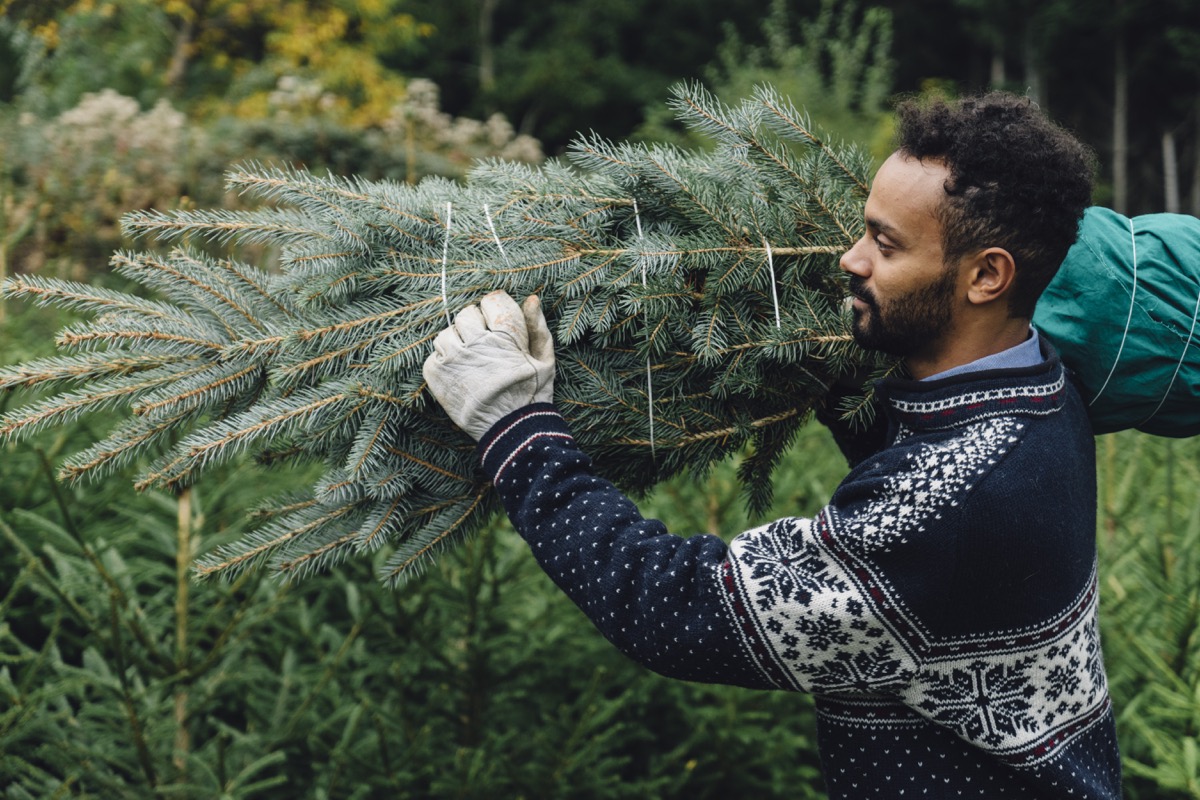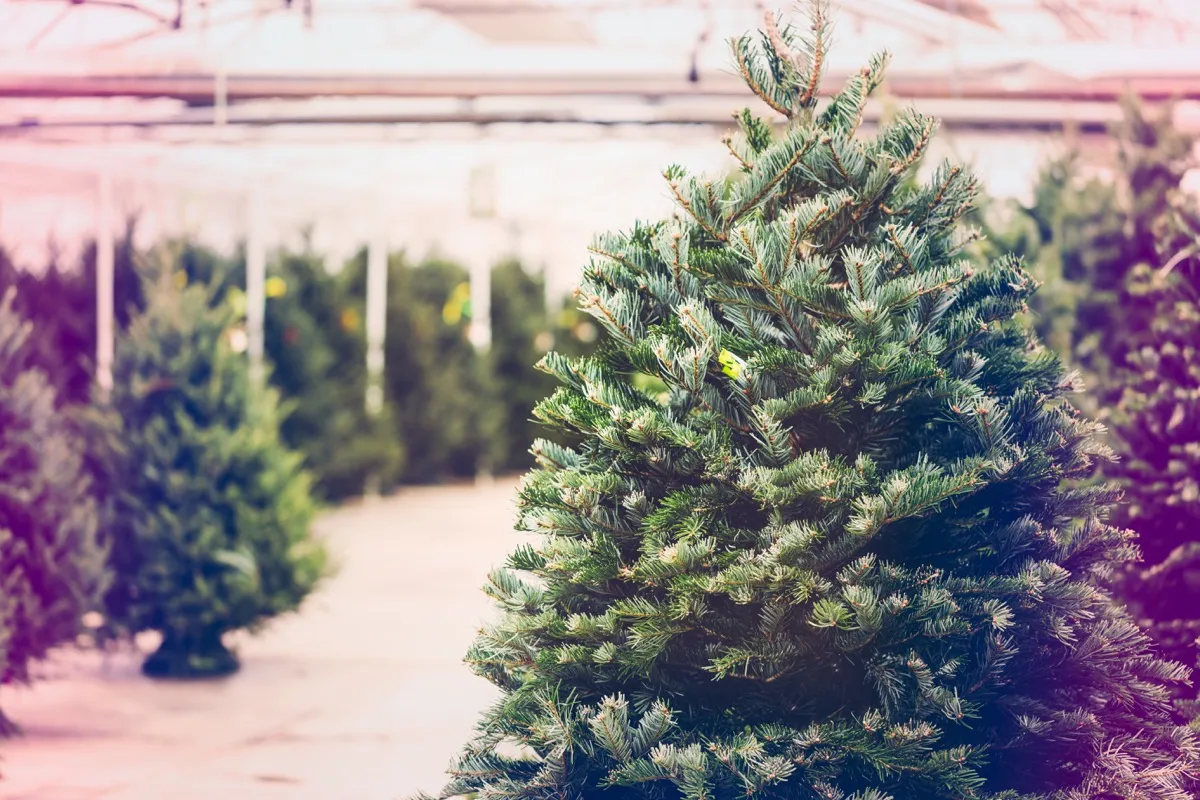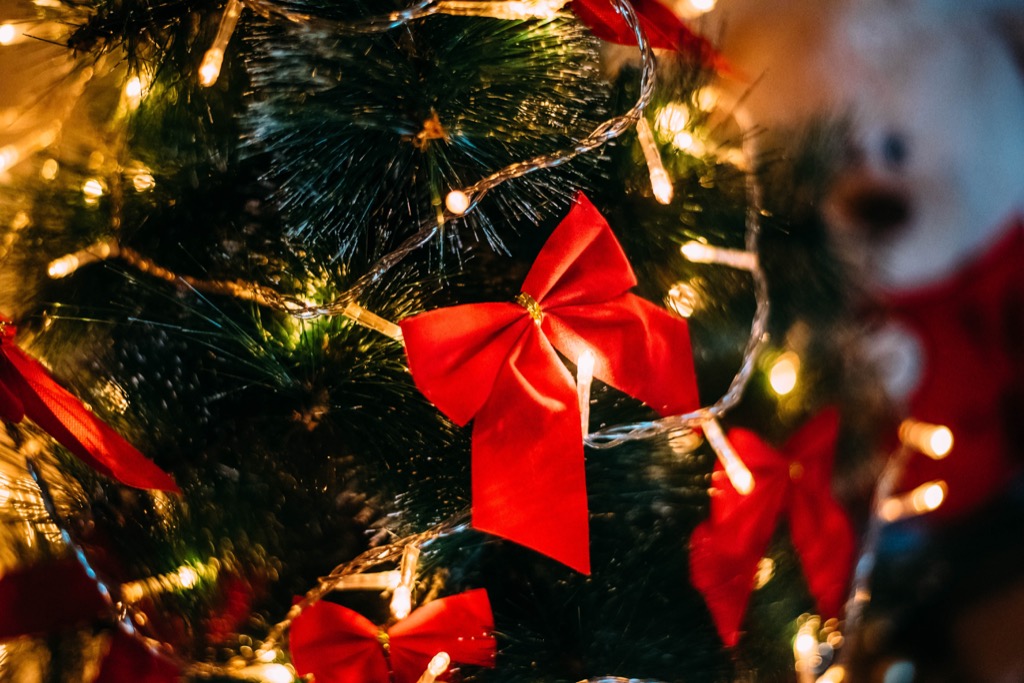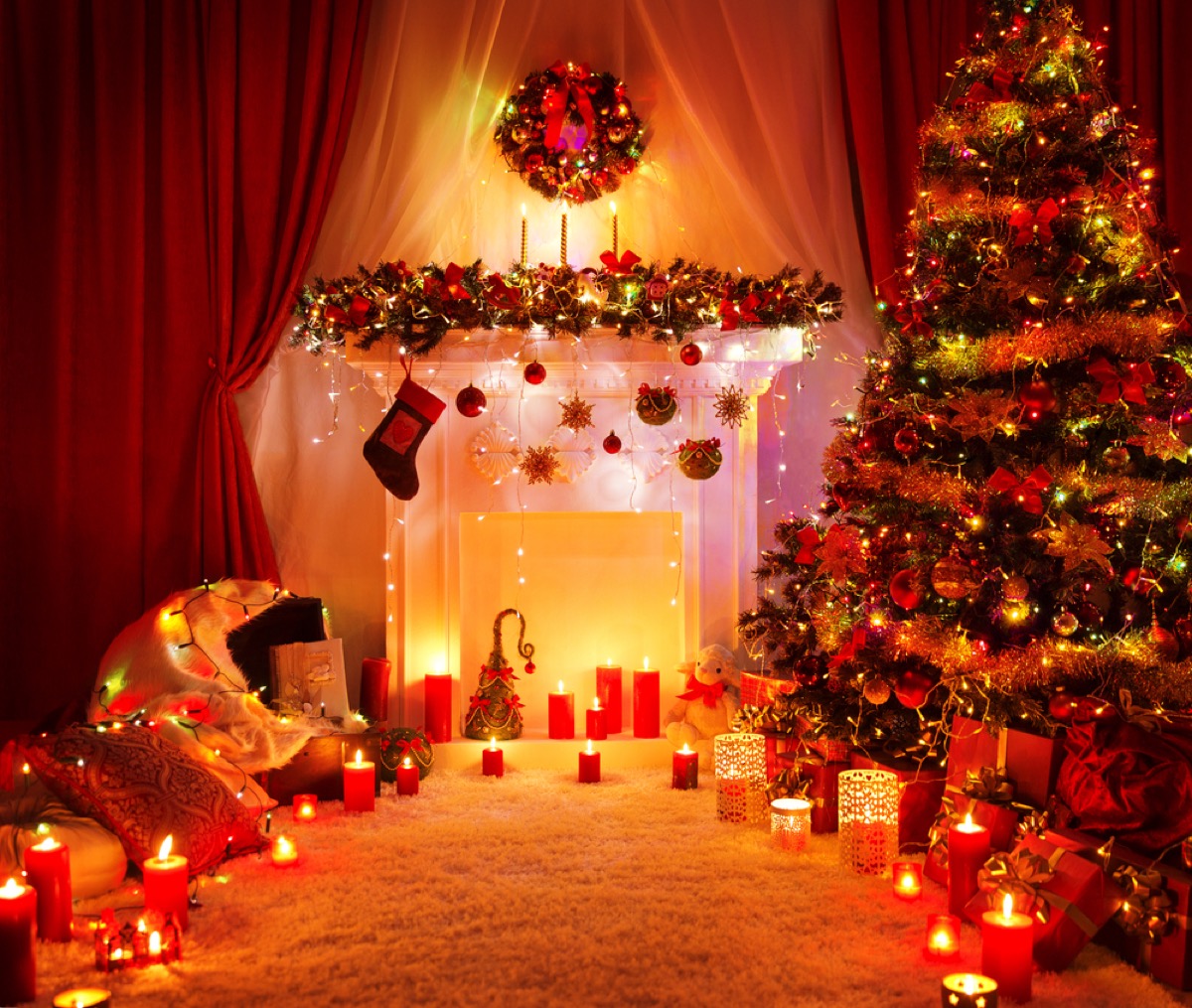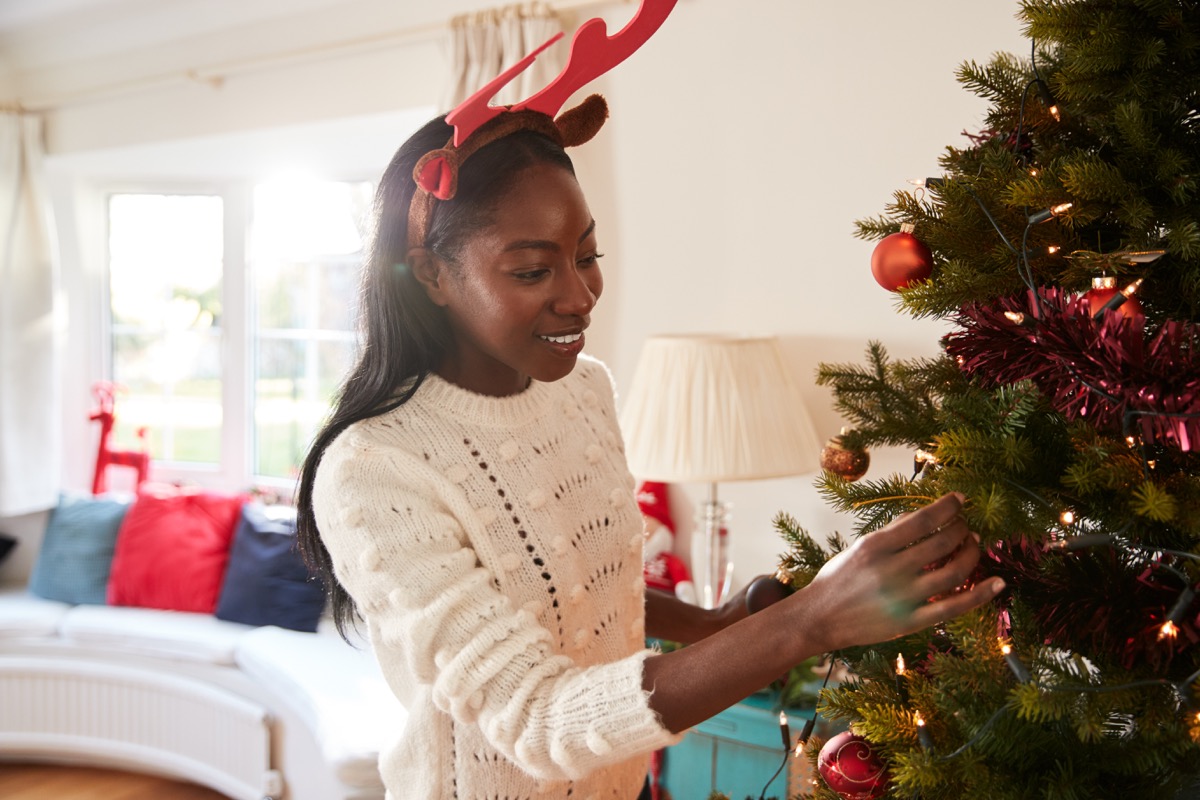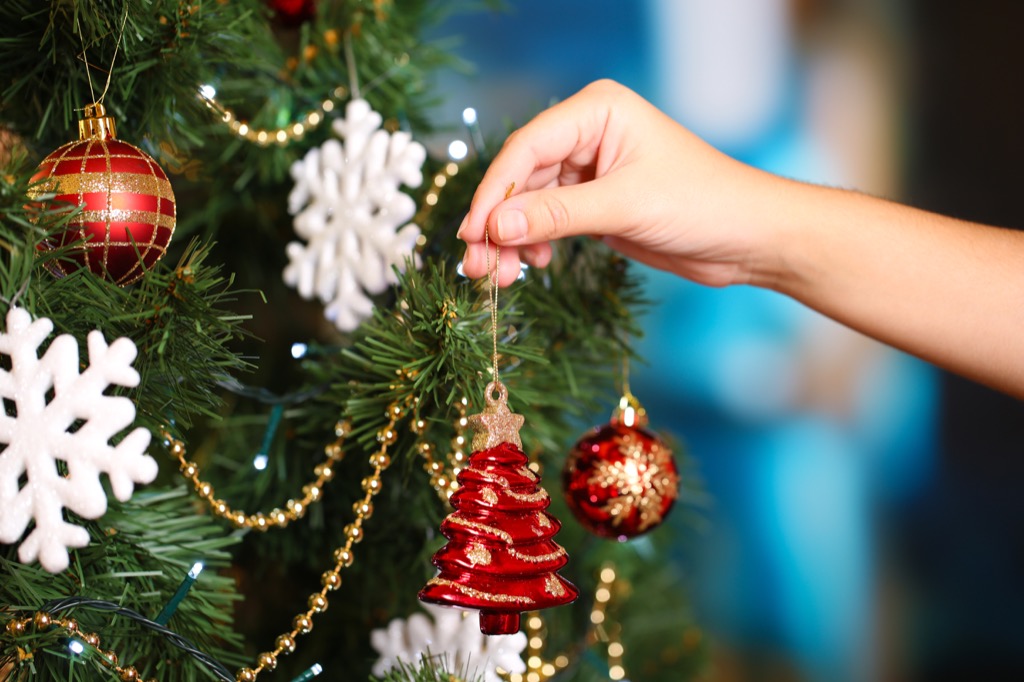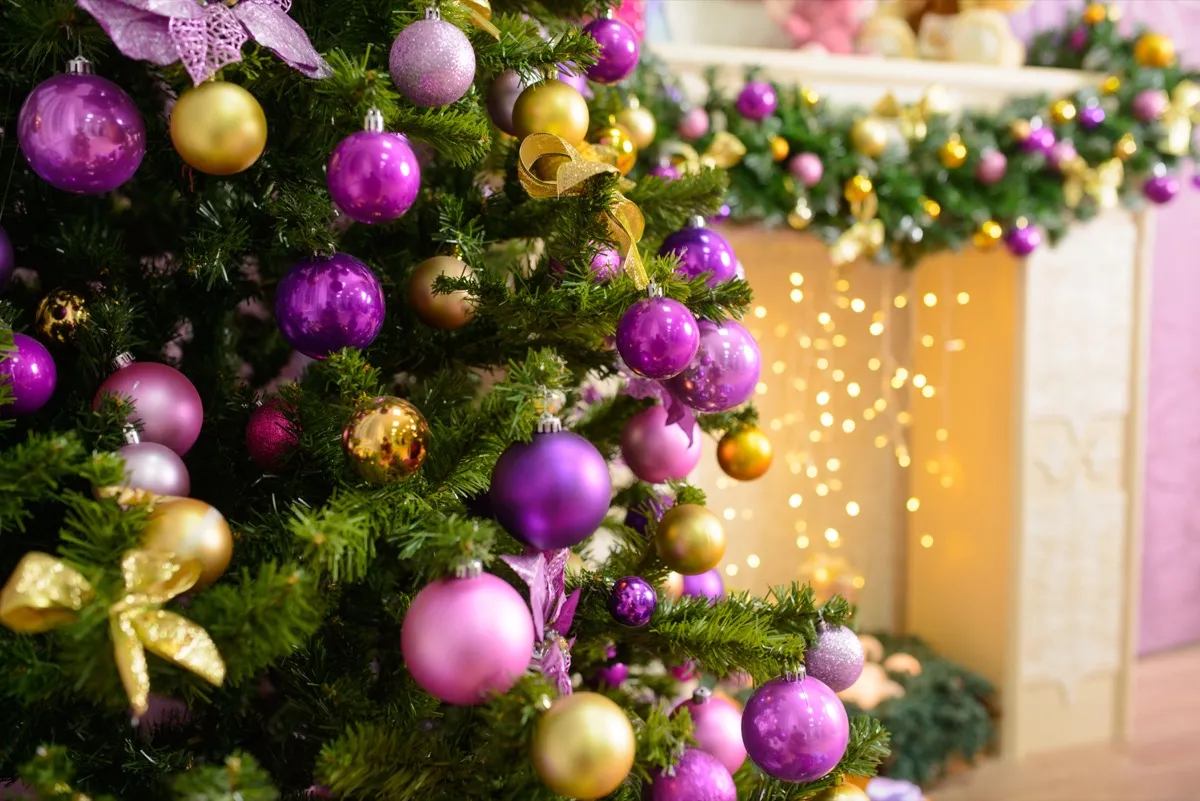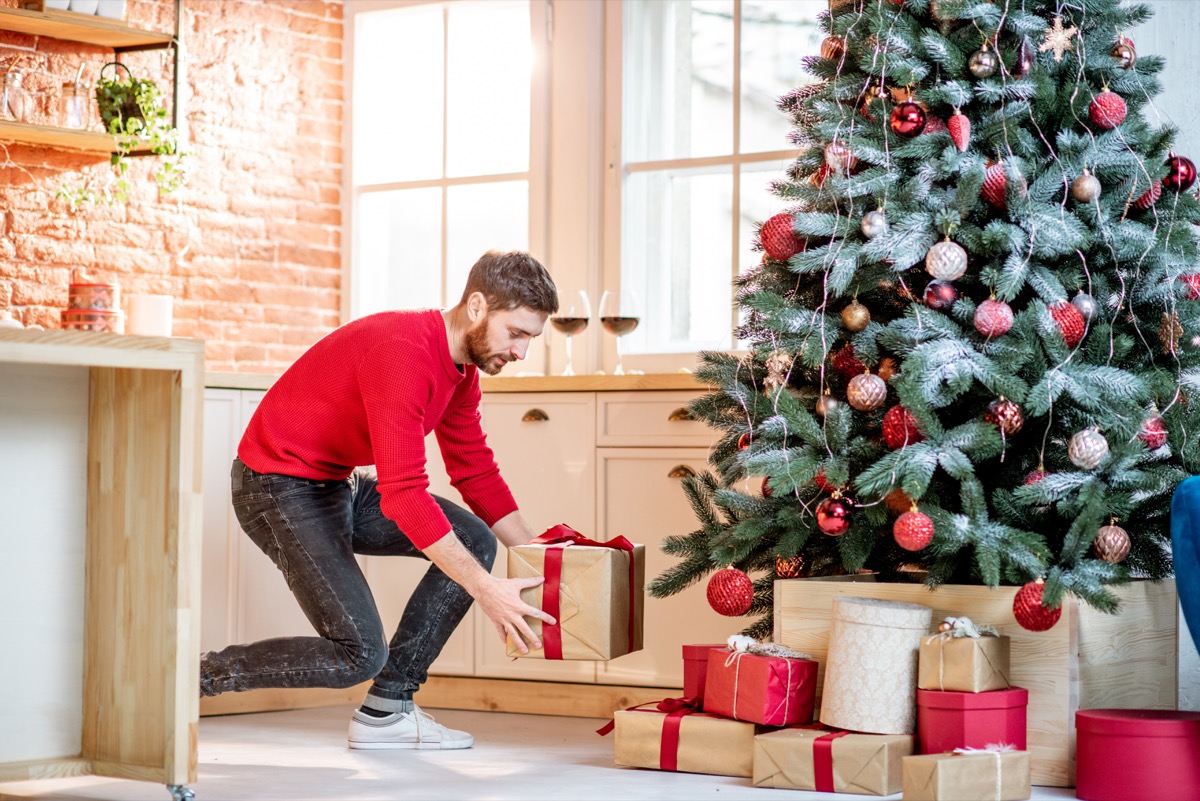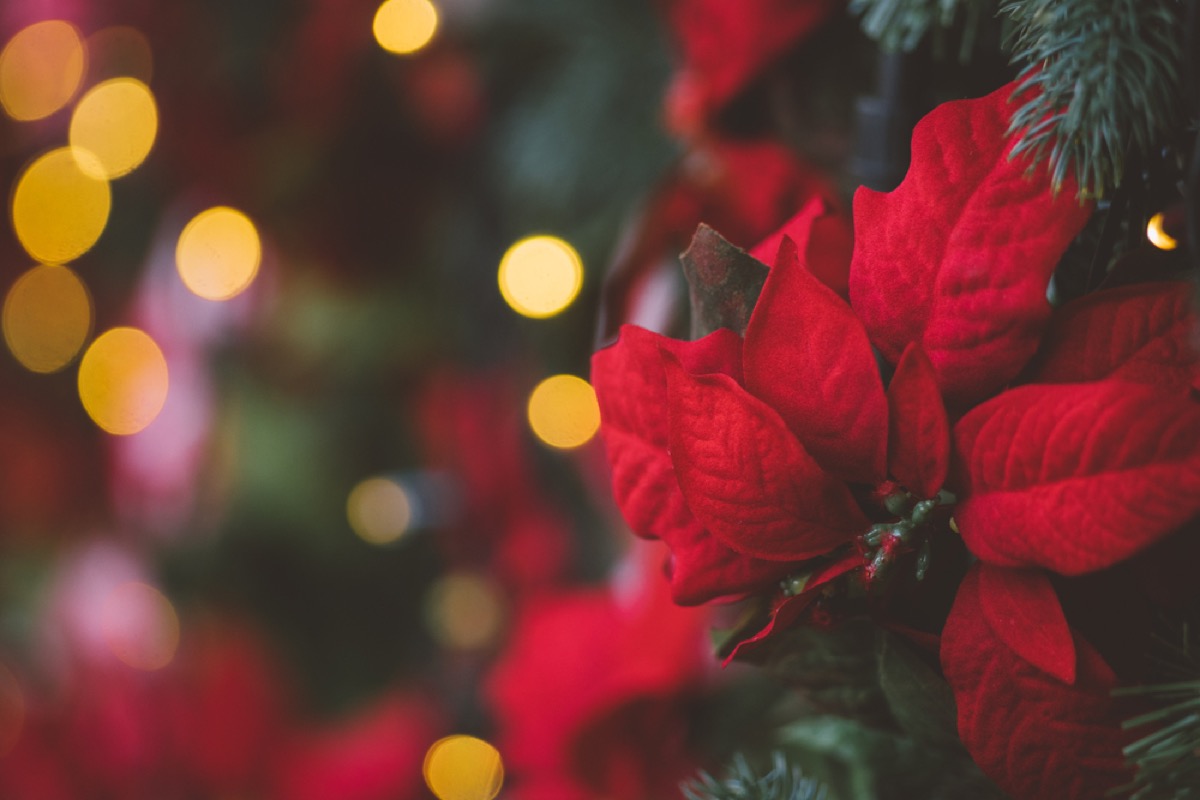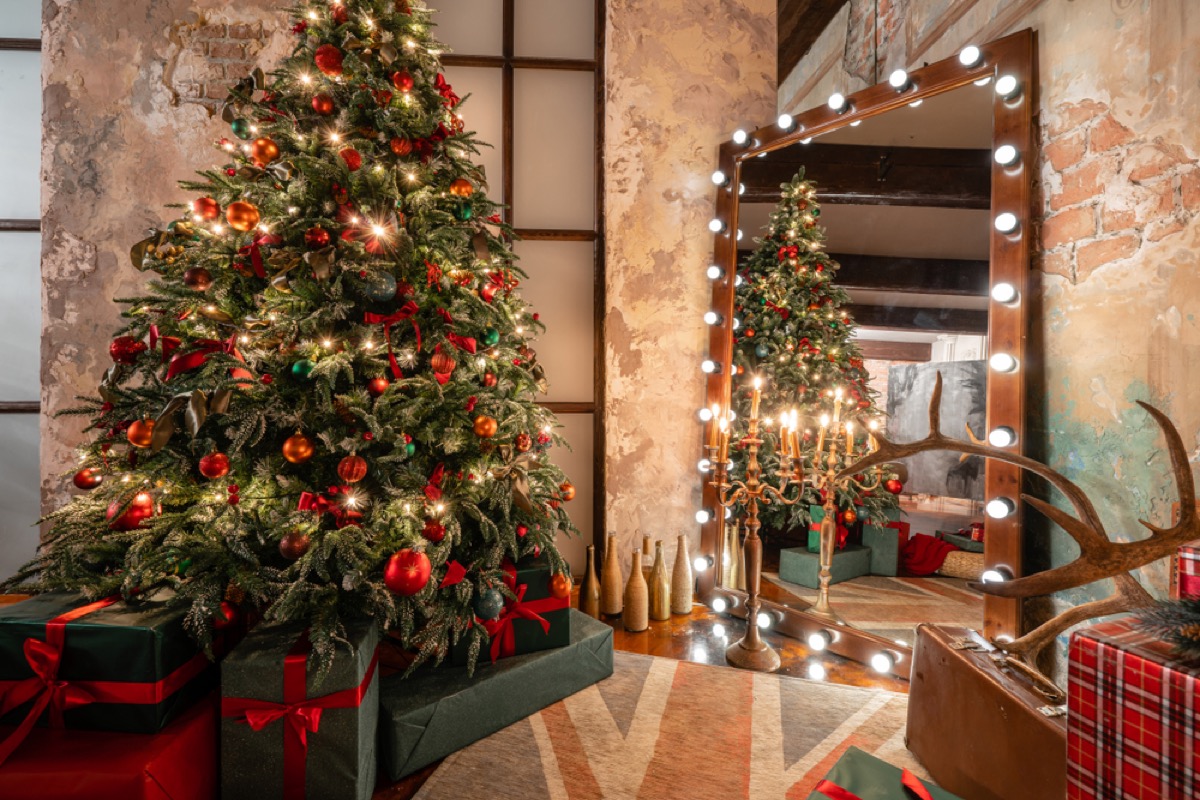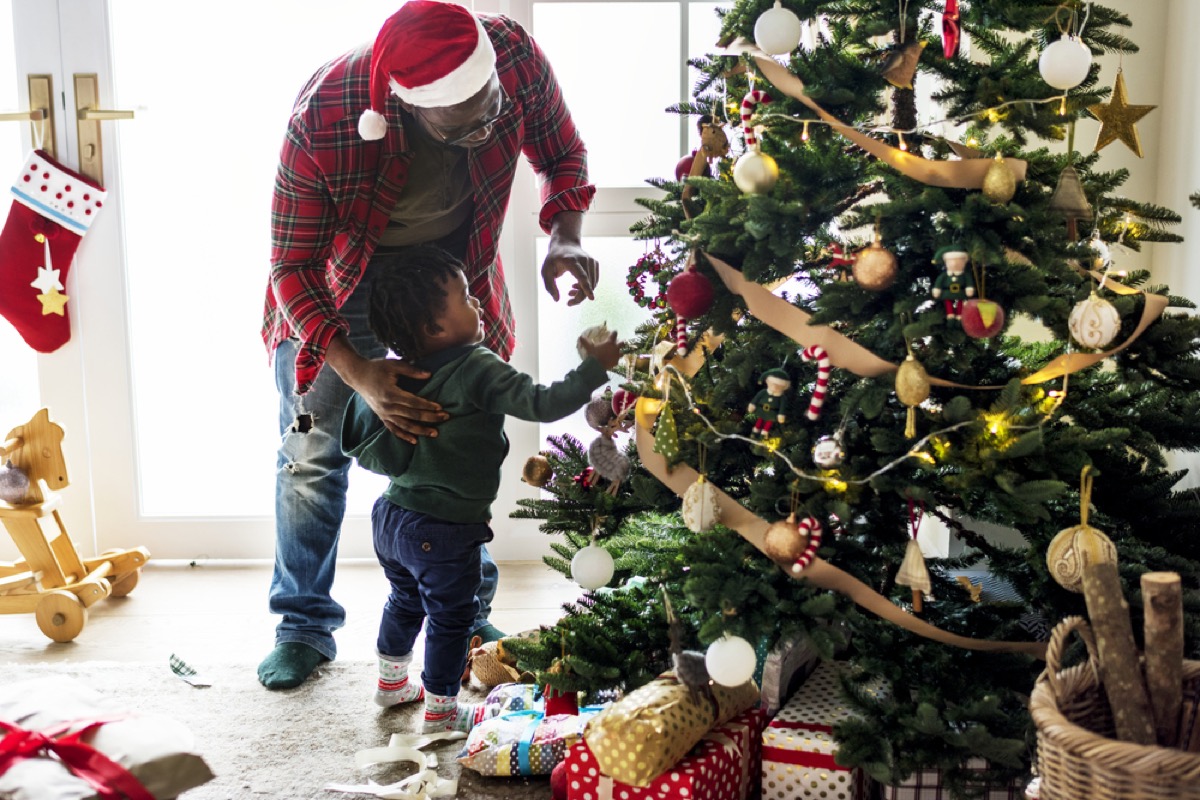Read the original article on Best Life. A great artist needs the right canvas. When purchasing your tree, make sure to tailor your choice to fit your decorations. A tree with noticeably separated branches and plenty of empty spaces would be best for displaying large ornaments—giving them room to breathe—while a more full-looking tree with branches close together is best for garland-heavy decorating. And make sure that you’re taking your room into account when picking out a tree, too. David Daniken, a Christmas tree expert with Daniken Tree Farm in Illinois, previously told Best Life that you should get a tree that will sit at least one foot below your ceiling. This takes into account the height that your tree stand and tree topper will add. And for more holiday trivia to share with your family, here are 55 Fun Christmas Facts to Get You in the Holiday Spirit. Before purchasing a set of Christmas lights, it’s important to consider what kind of tree you have and the decorating color scheme you want. For starters, the string itself should blend in with the tree. That means that green is best for real trees, while black or white—depending on the tree itself—works best for artificial ones. As for the color of the bulbs, Christina Hill, a decoration coordinator at Hassle Free Christmas Tree, recommends “combin[ing] two or three colors which complement well [and] accentuate your tree.” In addition, you need to decide between incandescent bulbs and LED ones. While the latter does not heat up and thus has a lesser chance of starting a fire, the heat from the former will have your tree emitting a wonderful scent of pine throughout the room. Just don’t plug in more than five sets of 100-bulb strings, warns Vinny Nicastro at The Christmas Decorators, or you could be setting yourself up for a dangerous situation. Decorating a Christmas tree is all about striking the right balance. And while finding a middle ground ultimately comes down to your personal taste, the experts at The Christmas Light Emporium urge the use of 100 mini lights and two strands of garland for every vertical foot of your tree. So, before splurging on that 15-footer you’ve always dreamed of, you might want to pad your lighting budget first. Nobody likes a meekly lit tree, after all! And for more on American Christmas traditions, here are the 20 Ways Christmas Is Celebrated Differently Across the U.S. Trees are living creatures, and to keep them looking their best, they need to be fed. According to Penn State University’s Department of Horticulture, this means placing them within a water basin that holds at least one gallon of water. As long as you have the tree on display in your home, this basin should be kept full at all times. During the first week after installation, trees will absorb more water than you might imagine, so it’s crucial to be vigilant about keeping the stand filled. With proper care, a fresh cut tree should last between four to six weeks, says Hill. Once the needles are dry and brittle, however, it’s time to take down that emblem of holiday cheer. Failing to do so isn’t just a bad look; it could pose a serious fire hazard! Before beginning to hang lights, ornaments, or garlands, it’s important to take the time to fluff out each individual branch, making sure any that may have stuck together are separated. Doing so may get your hands all sticky with your fir’s sap, but it’s worth it: Your tree will suddenly seem almost twice as large as it expands to its full potential.ae0fcc31ae342fd3a1346ebb1f342fcb In addition, don’t be afraid to twist and turn the branches in order to make sure there are no empty spaces between them. Leaving a large section of emptiness will draw attention away from your decorations. And for more on how the most regal stars celebrate the holidays, here are 15 Royal Christmas Traditions That You Need to Know About. Employ five to seven focal points on your tree. Whether you use unique pieces, especially large ornaments, or strands of flashing lights interspersed with traditional ones, these focal points will make even the most disorganized of trees appear to be well-thought-out works of art. And for some more holiday customs that you may not have heard of, here are 15 Weird, Forgotten Christmas Traditions Nobody Does Anymore. Not sure how to create focal points on your tree? One easy way to do so is with clusters of ornaments. Try using wire to cluster three or more spheres together to create a cute bauble. Not only will this help create focal points on your tree, but it will also reduce the amount of time you spend decorating. And for more things to do at home this holiday season, here are 20 Super Fun Games to Play on Christmas Eve. As the experts over at Lowe’s note, layering lights on your Christmas tree can make your tree pop. To do this, wrap white lights somewhat tightly around the interior of your tree—enough to provide illumination, but not so much that they distract from the tree itself. Then, wrap colored lights around the outside of the tree, using them sparingly as a highlight. With this technique, you’ll have a tree that not only shines outward—but appears to be alive on the inside as well. Decorating a great tree is all about making subtle contrasts—and one easy way to create that is to use lights of multiple sizes. While the majority should be the tiny, twinkly lights that won’t turn your living room into a lightbox, you should also throw in a few larger, colored lights for emphasis. For some holiday entertainment to keep you busy this year, here’s The Best Christmas Movie of All Time, According to Critics. This tip is not for those afraid of a little ingenuity. To create a “twinkle effect” in your tree, try placing a string of blinking lights at its base. The light will shine upward through the branches and create an ethereal effect reminiscent of the woods outside Rivendell. These twinkling lights can come in various speeds, so it’s important to make sure you get a set that replicates the glittering effect of a winter snowfall, not something you’d see at a club. If done properly, the result is something like being placed in a perpetual fairytale. For more holiday decorating tips and traditions sent to you directly, sign up for our newsletter. To bring more dimension to your tree, hang ornaments at various distances from the center. By dispersing your ornaments evenly on your tree, the pros at Lowe’s note that you can “create depth” and turn your tree into a true masterpiece. For the songs you get tired of around Christmas, check out The Most Hated Christmas Songs of All Time. In the hubbub that is the holiday season, it’s easy to rush the decorating process and place your ornaments willy-nilly—just to be done with it. But if you want your Christmas tree to be the envy of your neighbors, methodically pick out your favorite ornaments and hang them first, making sure they receive prominent placement. After that, hang the rest of your ornaments while keeping in mind the need to maintain balance. Ribbons are an excellent addition to any holiday décor, whether you’re tying a bow on your loved one’s Christmas gift or adding some visual appeal to your banister. Even better, however, is using a variety of ribbons to accent otherwise visually lackluster parts of your tree. Whether thin or thick, plaid or plain, silk or burlap, placing numerous, drastically different ribbons on the same tree in place of garland will create some serious visual appeal. As style expert Brad Schmidt explained on the Balsam Hill website, “ribbon gives you endless ways to dress up your tree, whether you want a classic look or prefer a dramatic design.” And if using ribbon as garland isn’t your style, you can always create oversized ribbon bows to hang from your tree’s branches in place of traditional ornaments. And for more obsolete holiday traditions that should be brought back, here are 13 Old-Fashioned Christmas Traditions We Should Revive. A tree can make a major impression when it’s designed around a single theme. Whether it’s a color, a holiday symbol, or even a specific style of ornaments, choosing a central theme will give your tree the unity it would otherwise lack. To harken back to your tree’s organic origin and to boost your home’s visual appeal, bring in some natural elements as decorative highlights on your Christmas tree. Pine cones, feathers, twigs, and berries are all excellent additions to your existing greenery. If you can’t be trusted with decorating your tree in a non-haphazard manner, feel free to go with a “plain Jane” look, sparsely populating your tree to show off its natural beauty. To show off your holiday artistry, make sure to place your tree near a large, preferably street-facing window. Just don’t put it too close to the window: As Christmas tree expert Deemer Cass previously explained to Best Life, this can prevent natural sunlight from entering your house and warming the room. Is using floral picks—fake flowers adhered to a decorative branch, for the uninitiated—to fill in spaces in your tree cheating? Maybe. Will it make your tree the envy or neighbors far and wide? Definitely. Despite what the au naturel naysayers may tell you, there’s nothing wrong with sticking in a few fake flowers here and there to finish off your tree. This isn’t about your tree, per se, but it’s an important step in making it look the best it can be. Choosing wrapping paper that matches your decorations will ensure that, once the presents are placed under the tree, it won’t be overshadowed, but accentuated. If it’s too difficult to find a match, try plain brown paper and a complementary colorful bow. Chances are, your tree is larger—or at least as large—as you are. If that’s the case, it’s almost impossible to determine whether or not it’s evenly decorated by standing right in front of it. So, make sure to occasionally take a step back and size it up from afar, as well as from different angles. Unless your tree is in a corner, it’s going to be seen from all sides, so you’re going to want to make sure it’s in tip-top shape any way you look at it!
